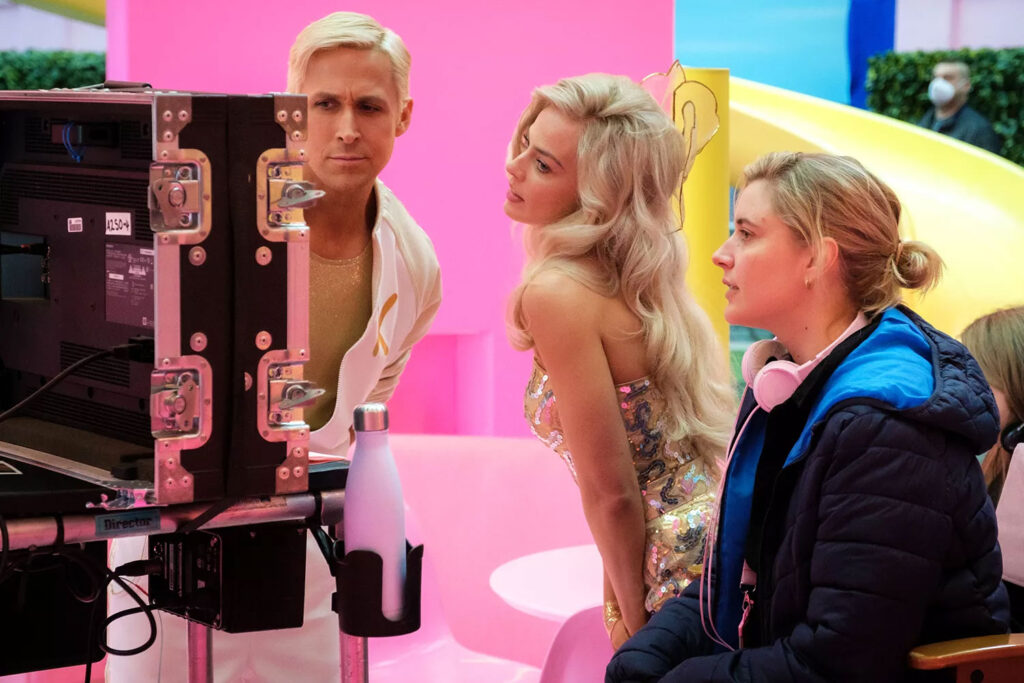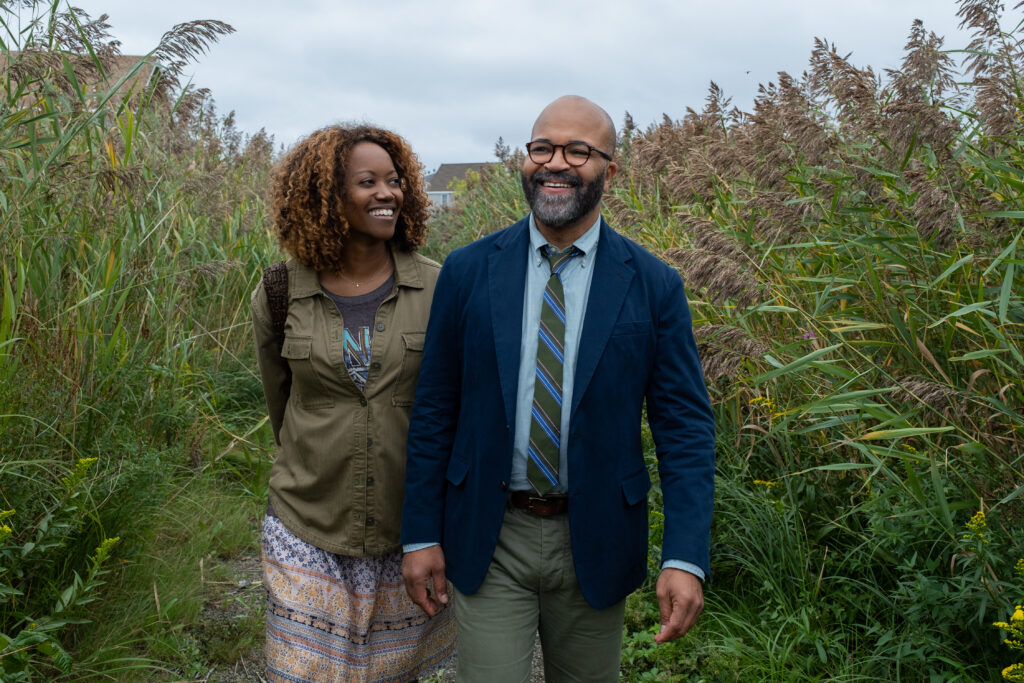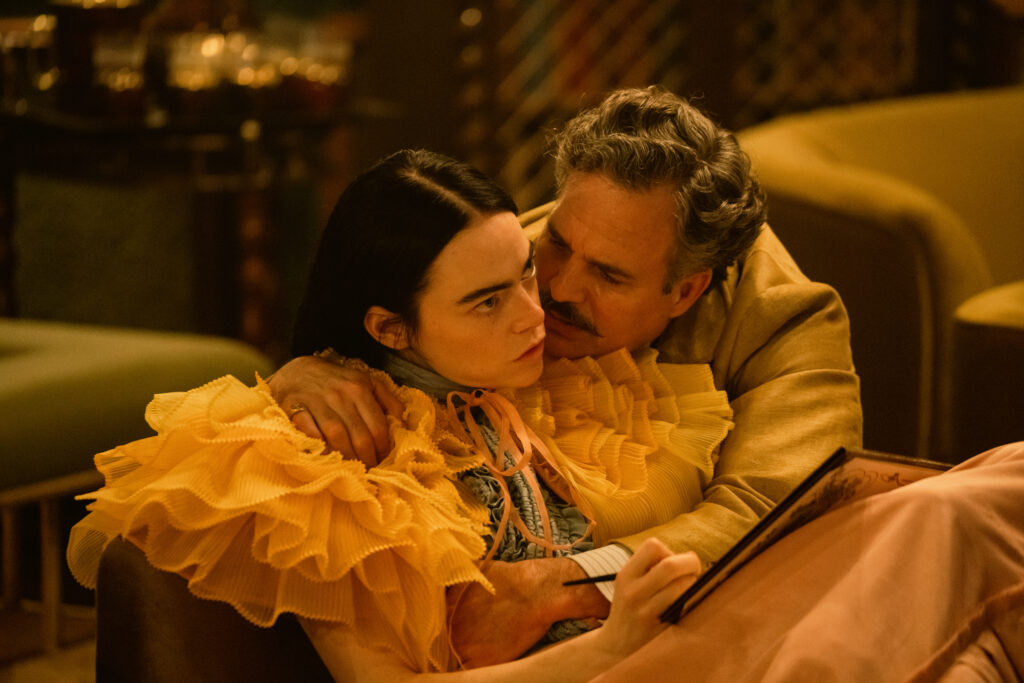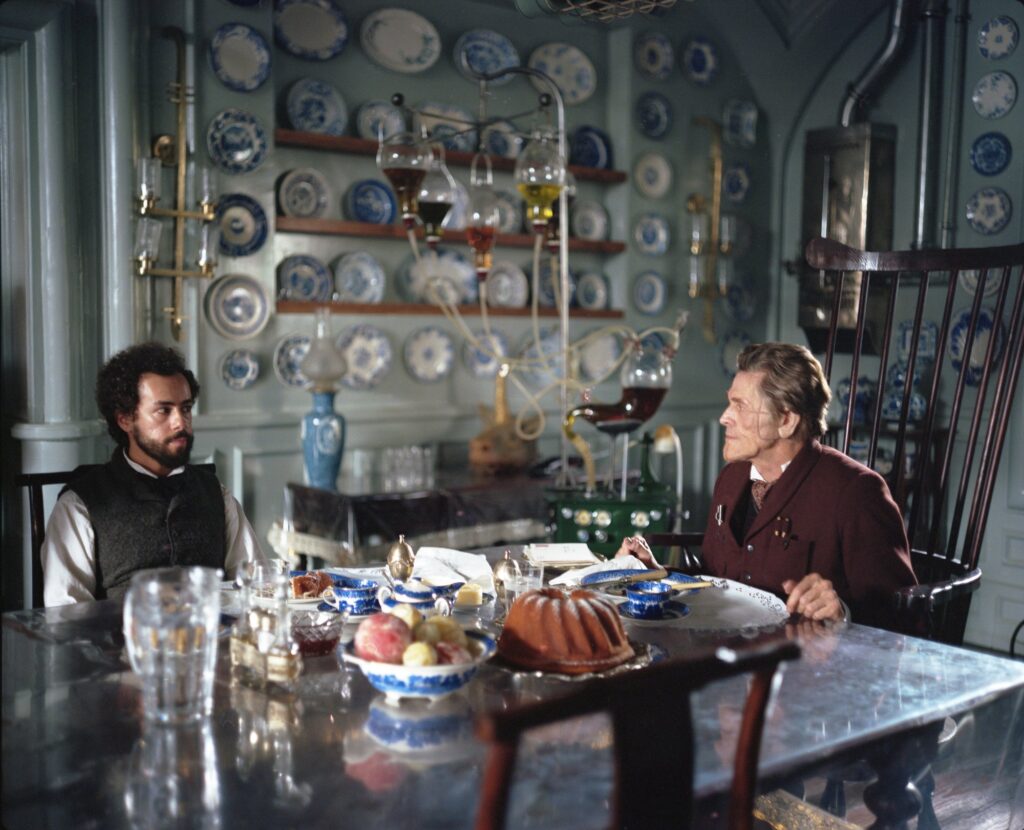March 10, 2024
by Carla Hay
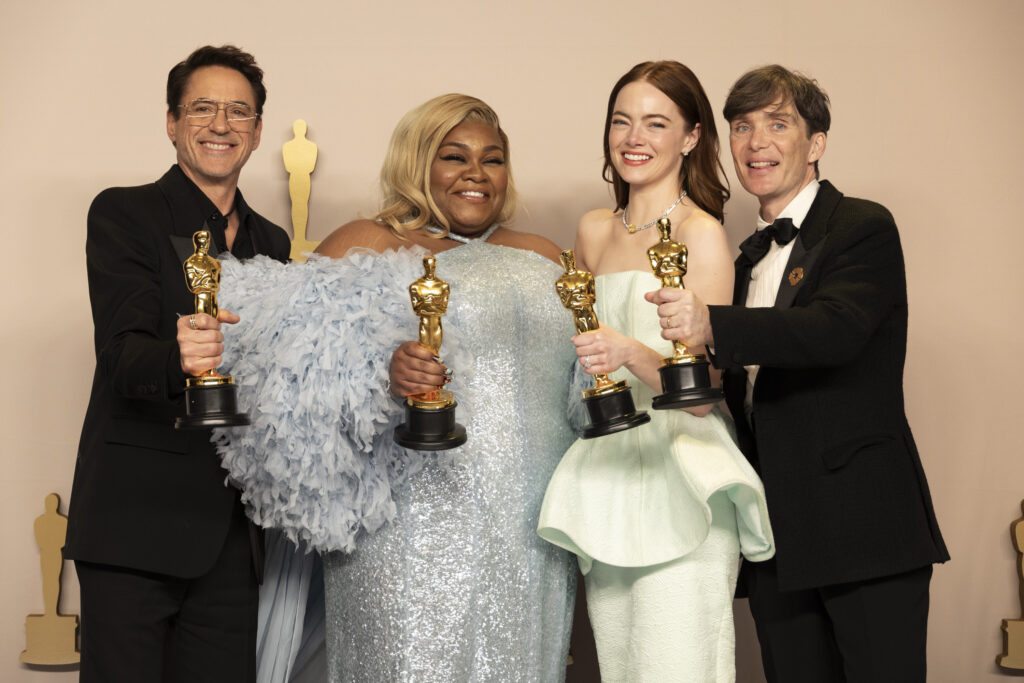
With seven prizes, including Best Picture, the Universal Pictures drama “Oppenheimer” (a biopic of atomic bomb creator J. Robert Oppenheimer) was the top winner for the 96th Annual Academy Awards, which took place at the Dolby Theatre in Los Angeles on March 10, 2024. ABC had the U.S. telecast of the show, which was hosted by Jimmy Kimmel.
In addition to Best Picture, “Oppenheimer” won Oscars for Best Director (for Christopher Nolan); Best Actor (for Cillian Murphy); Best Supporting Actor (for Robert Downey Jr.); Best Film Editing; Best Cinematography; and Best Original Score. “Oppenheimer” went into the ceremony with the most nominations: 13.
Searchlight Pictures’ sci-fi/comedy/drama “Poor Things” won four Oscars out of its 11 nominations: Best Actress (for Emma Stone); Best Production Design; Best Costume Design; and Best Makeup and Hairstyling. A24’s Holocaust drama “The Zone of Interest” won two Oscars: Best International Feature Film and Best Sound.
Some of the nominated movies won one Oscar each in the major categories: Da’Vine Joy Randolph of the Focus Features comedy/drama “The Holdovers” won Best Supporting Actress. Best Original Screenplay was awarded to Neon’s French drama “Anatomy of a Fall,” written by Justine Triet and Arthur Harari. Best Adapted Screenplay went to Orion Pictures’ comedy/drama “American Fiction,” written by Cord Jefferson.
The awards are voted for by the Academy of Motion Picture Arts and Sciences. For the 2024 ceremony, eligible movies were those released in the U.S. cinemas or in their native country in 2023.
Presenters at the show were Mahershala Ali, Bad Bunny, Emily Blunt, Nicolas Cage, Jamie Lee Curtis, Cynthia Erivo, America Ferrera, Sally Field, Brendan Fraser, Ryan Gosling, Ariana Grande, Chris Hemsworth, Dwayne Johnson, Michael Keaton, Regina King, Ben Kingsley, Jessica Lange, Jennifer Lawrence, Melissa McCarthy, Matthew McConaughey, Kate McKinnon, Rita Moreno, John Mulaney, Lupita Nyong’o, Catherine O’Hara, Al Pacino, Michelle Pfeiffer, Ke Huy Quan, Issa Rae, Tim Robbins, Sam Rockwell, Octavia Spencer, Steven Spielberg, Mary Steenburgen, Anya Taylor-Joy, Charlize Theron, Christoph Waltz, Forest Whitaker, Michelle Yeoh, Ramy Youssef and Zendaya.
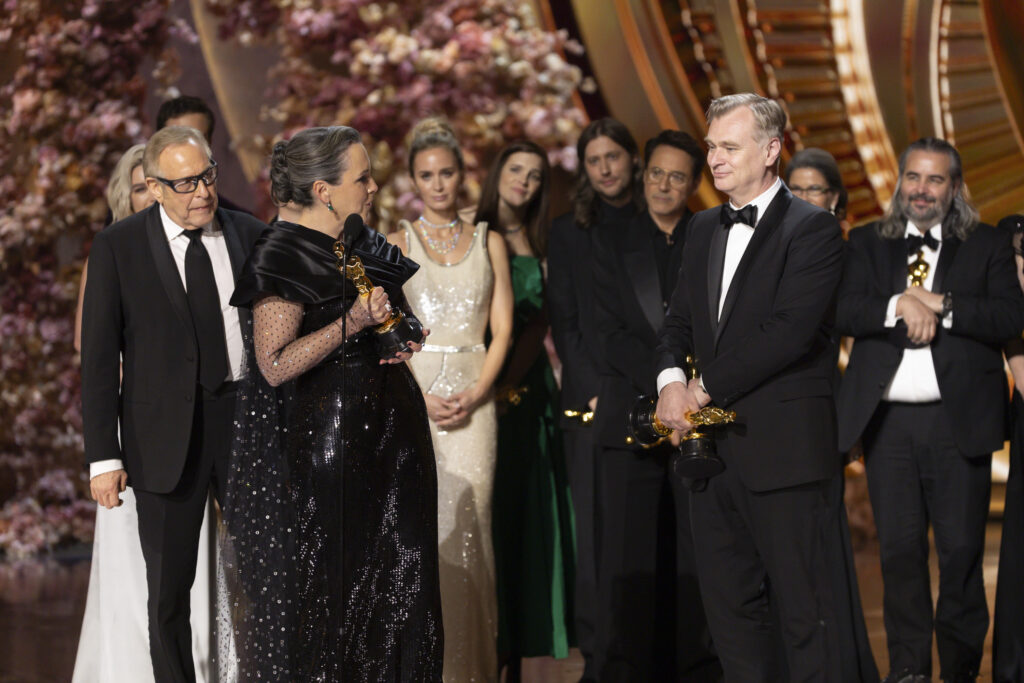
Here is the complete list of winners and nominations for the 2024 Academy Awards:
*=winner
Best Picture
“American Fiction,” Ben LeClair, Nikos Karamigios, Cord Jefferson and Jermaine Johnson, producers
“Anatomy of a Fall,” Marie-Ange Luciani and David Thion, producers
“Barbie,” David Heyman, Margot Robbie, Tom Ackerley and Robbie Brenner, producers
“The Holdovers,” Mark Johnson, producer
“Killers of the Flower Moon,” Dan Friedkin, Bradley Thomas, Martin Scorsese and Daniel Lupi, producers
“Maestro,” Bradley Cooper, Steven Spielberg, Fred Berner, Amy Durning and Kristie Macosko Krieger, producers
“Oppenheimer,” Emma Thomas, Charles Roven and Christopher Nolan, producers*
“Past Lives,” David Hinojosa, Christine Vachon and Pamela Koffler, producers
“Poor Things,” Ed Guiney, Andrew Lowe, Yorgos Lanthimos and Emma Stone, producers
“The Zone of Interest,” James Wilson, producer
Best Director
Justine Triet (“Anatomy of a Fall”)
Martin Scorsese (“Killers of the Flower Moon”)
Christopher Nolan (“Oppenheimer”)*
Yorgos Lanthimos (“Poor Things”)
Jonathan Glazer (“The Zone of Interest”)
Best Actor in a Leading Role
Bradley Cooper (“Maestro”)
Colman Domingo (“Rustin”)
Paul Giamatti (“The Holdovers”)
Cillian Murphy (“Oppenheimer”)*
Jeffrey Wright (“American Fiction”)
Best Actress in a Leading Role
Annette Bening (“Nyad”)
Lily Gladstone (“Killers of the Flower Moon”)
Sandra Hüller (“Anatomy of a Fall”)
Carey Mulligan (“Maestro”)
Emma Stone (“Poor Things”)*
Best Actor in a Supporting Role
Sterling K. Brown (“American Fiction”)
Robert De Niro (“Killers of the Flower Moon”)
Robert Downey Jr. (“Oppenheimer”)*
Ryan Gosling (“Barbie”)
Mark Ruffalo (“Poor Things”)
Best Actress in a Supporting Role
Emily Blunt (“Oppenheimer”)
Danielle Brooks (“The Color Purple”)
America Ferrera (“Barbie”)
Jodie Foster (“Nyad”)
Da’Vine Joy Randolph (“The Holdovers”)*
Best Adapted Screenplay
“American Fiction,” written by Cord Jefferson*
“Barbie,” written by Greta Gerwig and Noah Baumbach
“Oppenheimer,” written by Christopher Nolan
“Poor Things,” written by Tony McNamara
“The Zone of Interest,” written by Jonathan Glazer
Best Original Screenplay
“Anatomy of a Fall,” written by Justine Triet and Arthur Harari*
“The Holdovers,” written by David Hemingson
“Maestro,” written by Bradley Cooper and Josh Singer
“May December,” written by Samy Burch; story by Samy Burch and Alex Mechanik
“Past Lives,” written by Celine Song
Best Cinematography
“El Conde,” Edward Lachman
“Killers of the Flower Moon,” Rodrigo Prieto
“Maestro,” Matthew Libatique
“Oppenheimer,” Hoyte van Hoytema*
“Poor Things,” Robbie Ryan
Best Film Editing
“Anatomy of a Fall,” Laurent Sénéchal
“The Holdovers,” Kevin Tent
“Killers of the Flower Moon,” Thelma Schoonmaker
“Oppenheimer,” Jennifer Lame*
“Poor Things,” Yorgos Mavropsaridis
Best Sound
“The Creator,” Ian Voigt, Erik Aadahl, Ethan Van der Ryn, Tom Ozanich and Dean Zupancic
“Maestro,” Steven A. Morrow, Richard King, Jason Ruder, Tom Ozanich and Dean Zupancic
“Mission: Impossible – Dead Reckoning Part One,” Chris Munro, James H. Mather, Chris Burdon and Mark Taylor
“Oppenheimer,” Willie Burton, Richard King, Gary A. Rizzo and Kevin O’Connell
“The Zone of Interest,” Tarn Willers and Johnnie Burn*
Best Original Score
“American Fiction,” Laura Karpman
“Indiana Jones and the Dial of Destiny,” John Williams
“Killers of the Flower Moon,” Robbie Robertson
“Oppenheimer,” Ludwig Göransson*
“Poor Things,” Jerskin Fendrix
Best Original Song
“The Fire Inside” from “Flamin’ Hot,” music and lyric by Diane Warren
“I’m Just Ken” from “Barbie,” music and lyric by Mark Ronson and Andrew Wyatt
“It Never Went Away” from “American Symphony,” music and lyric by Jon Batiste and Dan Wilson
“Wahzhazhe (A Song For My People)” from “Killers of the Flower Moon,” music and lyric by Scott George
“What Was I Made For?” from “Barbie,” music and lyric by Billie Eilish and Finneas O’Connell*
Best Animated Feature Film
“The Boy and the Heron,” Hayao Miyazaki and Toshio Suzuki*
“Elemental,” Peter Sohn and Denise Ream
“Nimona,” Nick Bruno, Troy Quane, Karen Ryan and Julie Zackary
“Robot Dreams,” Pablo Berger, Ibon Cormenzana, Ignasi Estapé and Sandra Tapia Díaz
“Spider-Man: Across the Spider-Verse,” Kemp Powers, Justin K. Thompson, Phil Lord, Christopher Miller and Amy Pascal
Best International Feature Film
“Io Capitano” (Italy)
“Perfect Days” (Japan)
“Society of the Snow” (Spain)
“The Teachers’ Lounge” (Germany)
“The Zone of Interest” (United Kingdom)*
Best Documentary Feature
“Bobi Wine: The People’s President,” Moses Bwayo, Christopher Sharp and John Battsek
“The Eternal Memory,” Maite Alberdi
“Four Daughters,” Kaouther Ben Hania and Nadim Cheikhrouha
“To Kill a Tiger,” Nisha Pahuja, Cornelia Principe and David Oppenheim
“20 Days in Mariupol,” Mstyslav Chernov, Michelle Mizner and Raney Aronson-Rath*
Best Makeup and Hairstyling
“Golda,” Karen Hartley Thomas, Suzi Battersby and Ashra Kelly-Blue
“Maestro,” Kazu Hiro, Kay Georgiou and Lori McCoy-Bell
“Oppenheimer,” Luisa Abel
“Poor Things,” Nadia Stacey, Mark Coulier and Josh Weston*
“Society of the Snow,” Ana López-Puigcerver, David Martí and Montse Ribé
Best Costume Design
“Barbie,” Jacqueline Durran
“Killers of the Flower Moon,” Jacqueline West
“Napoleon,” Janty Yates and Dave Crossman
“Oppenheimer,” Ellen Mirojnick
“Poor Things,” Holly Waddington*
Best Production Design
“Barbie,” production design: Sarah Greenwood; set decoration: Katie Spencer
“Killers of the Flower Moon,” production design: Jack Fisk; set decoration: Adam Willis
“Napoleon,” production design: Arthur Max; set decoration: Elli Griff
“Oppenheimer,” production design: Ruth De Jong; set decoration: Claire Kaufman
“Poor Things,” production design: James Price and Shona Heath; set decoration: Zsuzsa Mihalek*
Best Visual Effects
“The Creator,” Jay Cooper, Ian Comley, Andrew Roberts and Neil Corbould
“Godzilla Minus One,” Takashi Yamazaki, Kiyoko Shibuya, Masaki Takahashi and Tatsuji Nojima*
“Guardians of the Galaxy Vol. 3,” Stephane Ceretti, Alexis Wajsbrot, Guy Williams and Theo Bialek
“Mission: Impossible – Dead Reckoning Part One,” Alex Wuttke, Simone Coco, Jeff Sutherland and Neil Corbould
“Napoleon,” Charley Henley, Luc-Ewen Martin-Fenouillet, Simone Coco and Neil Corbould
Best Documentary Short Subject
“The ABCs of Book Banning,” Sheila Nevins and Trish Adlesic
“The Barber of Little Rock,” John Hoffman and Christine Turner
“Island in Between,” S. Leo Chiang and Jean Tsien
“The Last Repair Shop,” Ben Proudfoot and Kris Bowers*
“Nǎi Nai & Wài Pó,” Sean Wang and Sam Davis
Best Animated Short Film
“Letter to a Pig,” Tal Kantor and Amit R. Gicelter
“Ninety-Five Senses,” Jerusha Hess and Jared Hess
“Our Uniform,” Yegane Moghaddam
“Pachyderme,” Stéphanie Clément and Marc Rius
“War Is Over! Inspired by the Music of John & Yoko,” Dave Mullins and Brad Booker*
Best Live-Action Short Film
“The After,” Misan Harriman and Nicky Bentham
“Invincible,” Vincent René-Lortie and Samuel Caron
“Knight of Fortune,” Lasse Lyskjær Noer and Christian Norlyk
“Red, White and Blue,” Nazrin Choudhury and Sara McFarlane
“The Wonderful Story of Henry Sugar,” Wes Anderson and Steven Rales*


